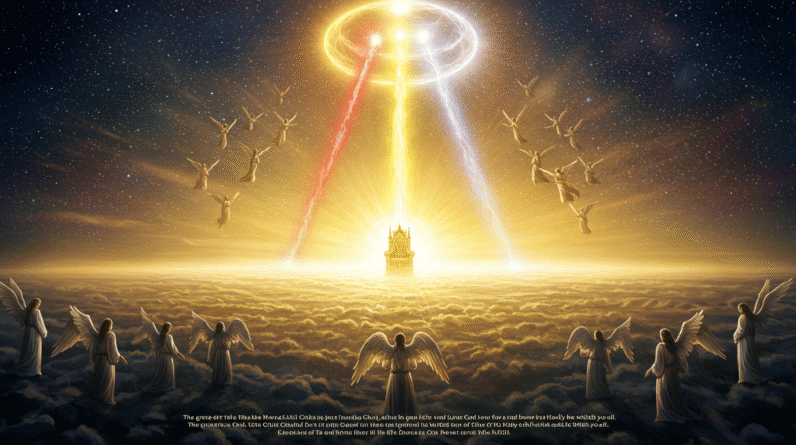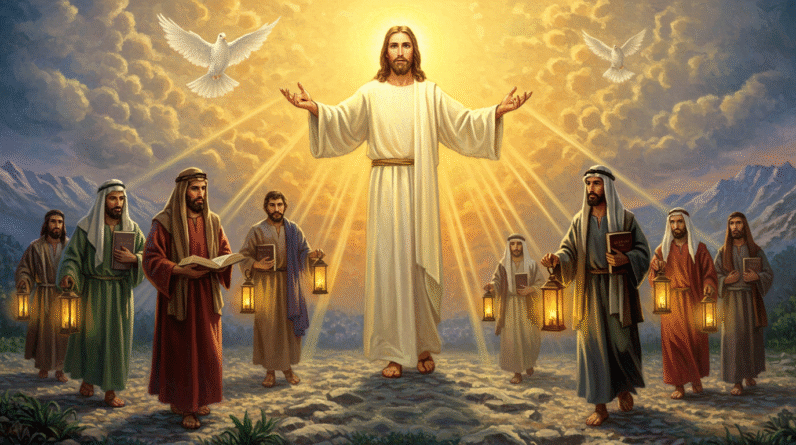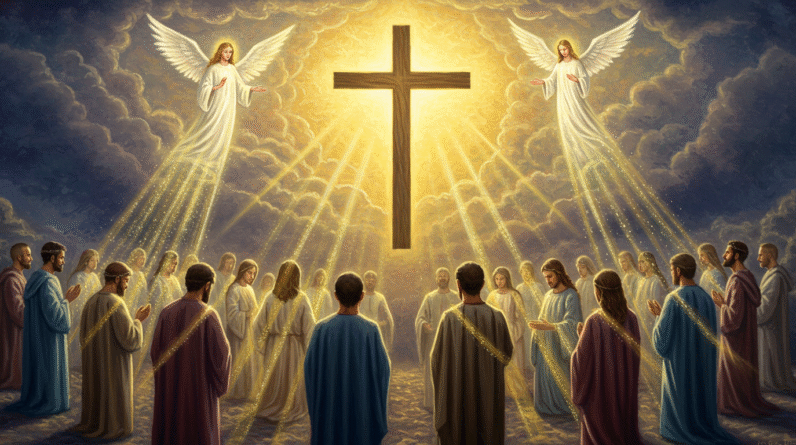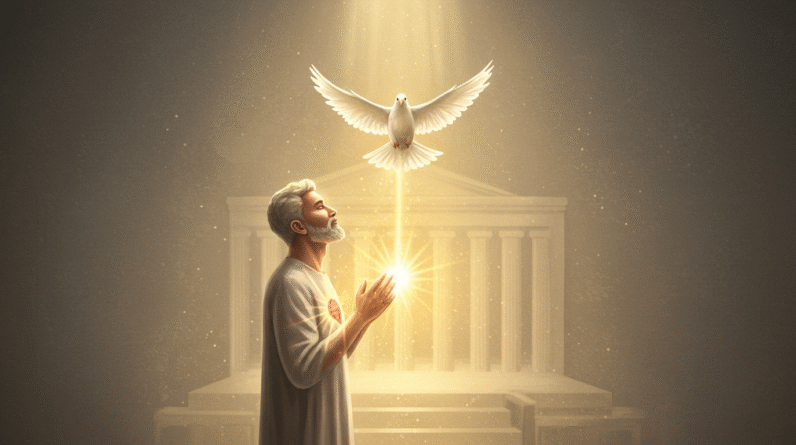The Son As The Word Of God (John 1:1)
You come to John 1:1 and find a sentence that stands at the heart of Christian faith: “In the beginning was the Word, and the Word was with God, and the Word was God.” John 1:1. Those words are not merely theological jargon; they are an invitation. They call you to look at Jesus Christ not only as a moral teacher or a prophet, but as the living, eternal Word — the very self-expression of God. In this article, you’ll walk slowly through the meaning of “Word” (Logos), the relationship between the Persons of the Trinity, the Son’s role in creation and redemption, and the way this truth shapes your life. I will point you again and again to Scripture so you can test these truths against God’s Word.
John 1:1 in Context
When you read John 1:1, it helps to stand in the doorway of the whole Gospel. John is not starting with a biography like the other Gospels. He begins with theology. He wants you to see Jesus from the vantage point of eternity — the One who existed “in the beginning.” John 1:1 echoes Genesis and deliberately ties Jesus to the God who speaks creation into being. The opening of John’s Gospel is a panoramic view: the Word is eternal, distinct, divine, the agent of creation, and the One who became flesh to dwell among you. You can’t read just a line and walk away; you must listen.
When John later says “Through him all things were made” in verse 3, he makes the connection explicit between the Word and creation. John 1:3 Nothing exists that is not shaped by the Son’s creative power. That means when you admire the sunrise or tremble at a storm, you are beholding the handiwork of the Word. This is worship as well as wonder.
The Greek Term ‘Logos’ and Its Meaning
The term “Word” translates the Greek Logos, a rich word carrying many shades of meaning. In John’s day, Logos had philosophical and religious resonances. Greek thinkers used Logos to describe reason or principle that ordered the universe. Jewish thought spoke of God’s Word as active and personal — the means by which God created and revealed Himself. John borrows these ideas but transforms them: the Logos is not an abstract principle; the Logos is a Person — Jesus Christ.
To understand Logos deeper, look back into the Old Testament, where God communicates and creates by speech. In Genesis, God speaks and the world appears: “In the beginning God created the heavens and the earth,” and God said, “Let there be light.” Genesis 1:1-3 That creative speech is no mere metaphor; John identifies that divine speech with the Son. The concept also resonates with passages like Psalm 33:6, which says that by the Lord’s word the heavens were made. Psalm 33:6
You should notice how John takes what was once an idea about powerful speech and turns it into a declaration about a person. The Word is not only how God expresses Himself; the Word is God. That truth frames everything that follows in Scripture and in your life.
The Word Was With God
When John writes “the Word was with God,” he stresses distinction and relationship. John 1:1 You are confronted with both closeness and personality: the Word is not identical with the Father in the sense that they are two separate beings; rather, the Word is a distinct Person who relates to the Father in fellowship and love. This “with” speaks of intimate communion — the Trinity’s internal life.
You can see this personal relationship dramatized in the baptism of Jesus, where Father, Son, and Spirit appear uniquely and together: “As soon as Jesus was baptized, he went up out of the water… and a voice from heaven said, ‘This is my Son, whom I love; with him I am well pleased.'” Matthew 3:16-17 At that moment, you do not have a vague divine power; you have Persons interacting. The Son prays, the Father speaks, the Spirit descends. That scene helps you visualize what John is describing in theological language.
This “with” is pastoral as well as doctrinal. It means the Son shares an eternal fellowship with the Father, and that fellowship is the source of love, truth, and mission. When you pray to the Father in the name of the Son, you participate in that communion, and the Spirit carries your prayer.
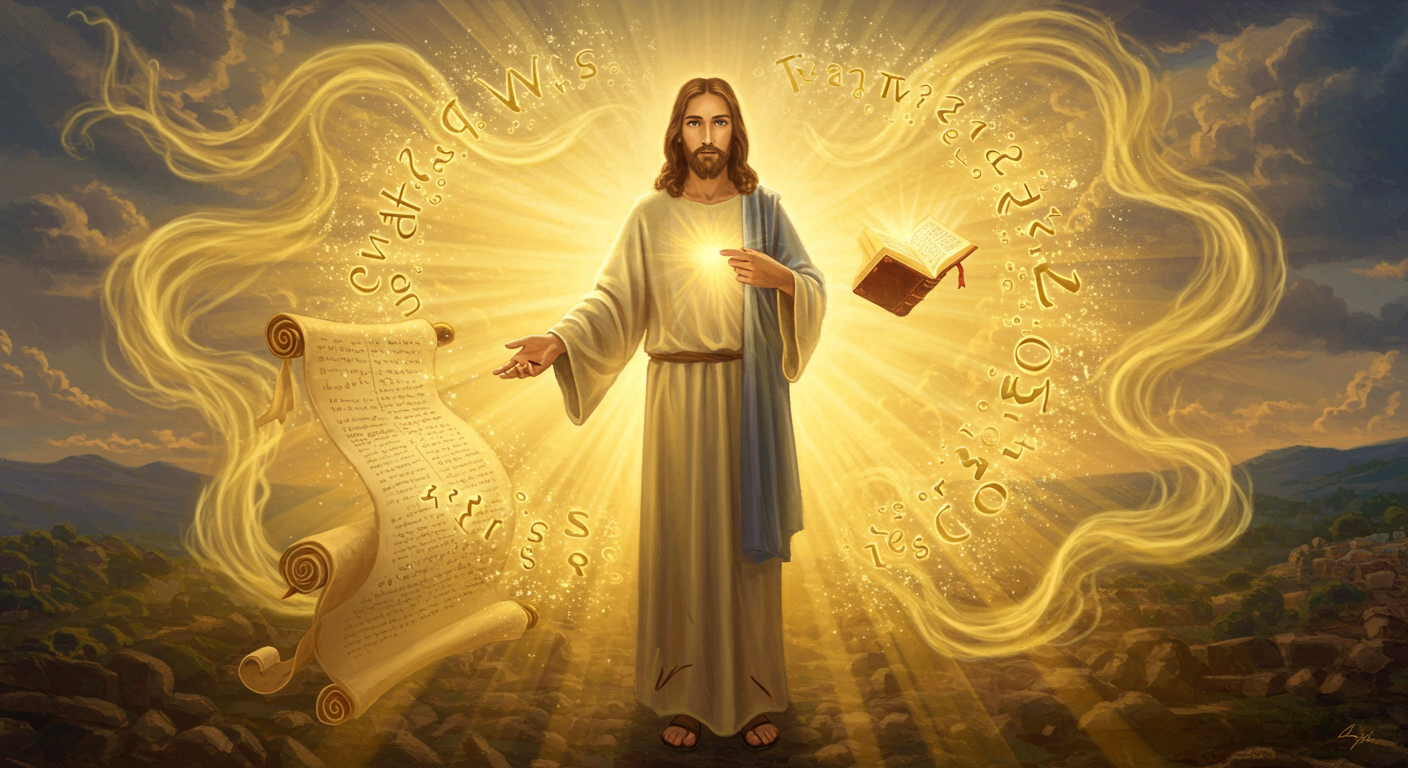
The Word Was God
Then John brings you to the summit: “the Word was God.” John 1:1 This is not a metaphor. It is a statement about essence and identity. The Son possesses fully the nature of God. That is why the early church confessed Jesus as Lord and honored Him with worship. Scripture repeatedly anchors this truth.
The writer of Hebrews tells you that the Son is “the radiance of God’s glory and the exact representation of his being.” Hebrews 1:3 You do not worship a shadow or copy; you worship the very image of God. When you look at Jesus — his compassion, holiness, justice, and mercy — you see God’s character manifest in flesh. And in Colossians, Paul affirms that “in Christ all the fullness of the Deity lives in bodily form.” Colossians 2:9
This is the heart of the Incarnation: the eternal God taking on human nature. There was never a time when the Word was absent from deity; the Word always shared divine being. That is why Jesus could say “I and the Father are one.” John 10:30 He could forgive sins, accept worship, and call Himself the Son of God with authority. Your faith rests on this conviction that Jesus is truly God.
The Trinity Revealed Through Scripture
You might wonder how Scripture can speak of one God and yet distinguish Father, Son, and Holy Spirit. The Bible consistently presents both unity and multiplicity. Old Testament faith affirms one God: “Hear, O Israel: The Lord our God, the Lord is one.” Deuteronomy 6:4 Yet the New Testament unfolds God’s self-revelation as Father, Son, and Spirit engaged in creation, redemption, and sanctification.
The baptismal command Christ gives before He ascends seals this Trinitarian form of faith: “baptizing them in the name of the Father and of the Son and of the Holy Spirit.” Matthew 28:19 Christianity is not simply monotheism plus a doctrine; it is the Bible’s own witness to a triune God. The closing benediction of Paul’s second letter to the Corinthians encapsulates this in a pastoral way: “May the grace of the Lord Jesus Christ, and the love of God, and the fellowship of the Holy Spirit be with you all.” 2 Corinthians 13:14 That is how God relates to you — as a fellowship of Persons extending grace, love, and community.
You should not treat the Trinity as a puzzle to be solved by human reason alone. It is a mystery revealed progressively by God. Still, the Bible makes it clear: the three Persons are distinct yet unified in essence and purpose.
The Father, Son, and Holy Spirit in the Gospels
You see the Trinity moving in the Gospels in ways that are simple yet profound. The baptism of Jesus shows all three Persons present and active: Christ is baptized, the Spirit descends like a dove, and the Father speaks. Matthew 3:16-17 When Jesus promises the Advocate, he speaks of the Spirit whom the Father will send in His name: “I will ask the Father, and he will give you another advocate to help you and be with you forever.” John 14:16-17
These episodes teach you about mission and unity. The Father sends the Son; the Son accomplishes redemption; the Spirit applies salvation to your heart. Each Person acts in harmony toward the single end of restoring rebels to God’s love.
Unity and Distinction: How to Think About One God in Three Persons
A helpful way to approach the Trinity is to balance two truths: unity of essence and distinction of persons. You are not to confuse the Persons (which would reduce the Trinity to modalism) nor split God into three gods (which would be tritheism). Scripture carefully preserves both aspects. Jesus himself prays to the Father — a prayer between Persons — and claims unity of being at the same time. John 14:9 The Spirit is treated as more than a force when Paul rebukes Ananias for lying to the Holy Spirit and equates it with lying to God. Acts 5:3-4
Your mind may struggle with mystery, and that’s natural. But remember: mystery in this case is not a gap or contradiction; it is a depth of reality where love and relationship exist eternally. The Trinity shows you that God is not solitary; God is relational. That has pastoral consequences: you are made for relationship, and the God who made you exists in eternal communion.
The Son as the Agent of Creation and Revelation
John teaches that the Word is creative speech: everything came into being through him. John 1:3 This aligns with Paul’s portrait of Christ as the agent through whom God created all things: “For in him all things were created: things in heaven and on earth, visible and invisible.” Colossians 1:16-17 When you marvel at stars or contemplate the intricacy of life, do not forget whom you are admiring — the Word who spoke and sustains everything.
The Old Testament also shows God revealing Himself through speech. Proverbs personifies Wisdom, calling people to follow her ways, and speaks of Wisdom’s role in creation. Proverbs 8:22-31 John adopts such motifs but centers them on the historical person of Jesus Christ. The Word is both the creative agent and the revealer of God’s heart. He is not remote; he comes to tell you who God is and how God loves you.
This has immediate implications: revelation matters. The Bible is not merely human advice; it sits under the authority of the Word who created and speaks. When Christ reveals God’s heart, you are offered not only knowledge but transformation.
The Word Becoming Flesh: Incarnation
One of the most tender and startling phrases in John is “The Word became flesh and made his dwelling among us.” John 1:14 There is no theological abstraction here. The eternal Word entered human history, assumed humanity, and lived as a vulnerable person among people. He ate, slept, wept, taught, and bled. This is the heart of Christian hope: your God did not remain aloof; he entered your world to redeem it.
The apostle Paul captures this humility when he writes that Christ, “being in very nature God, did not consider equality with God something to be used to his own advantage; rather, he made himself nothing by taking the very nature of a servant.” Philippians 2:6-7 The incarnation is not God’s surrender of glory but God’s condescension in love. You can touch God because God touched you. This changes everything — your worth, your purpose, your destiny.
When the Word became flesh, he revealed God’s face. John writes that “we have seen his glory, the glory of the one and only Son, who came from the Father.” John 1:14 If you want to know who the Father is, look at the Son.
The Word as Savior and Judge
The Son’s divinity is not merely theological trivia; it undergirds salvation. Only someone who is both fully God and fully human can bridge the gap between a holy God and sinful humanity. Hebrews explains that the Son shared in your flesh and blood so that by his death he might destroy the one who holds the power of death (the devil) and free those who all their lives were held in slavery by their fear of death. Hebrews 2:14-15
Because Christ is God, his atoning sacrifice is sufficient for all. He bears your sins and reconciles you to the Father. That is why John insists you can receive the right to become children of God if you believe in his name. John 1:12 And Paul sums up the simplicity of faith when he says if you confess with your mouth that Jesus is Lord and believe in your heart that God raised him from the dead, you will be saved. Romans 10:9
Yet the same Word who saves will also judge. Jesus says the Father has entrusted all judgment to the Son. John 5:22 That ought to awaken you to seriousness and hope: serious because you will answer to the living God; hopeful because the judge can be your Savior if you come to him in repentance.
Practical Implications for Your Faith
Knowing Jesus as the Word has daily consequences for how you live. You worship a God who speaks — therefore Scripture is central. You encounter God through the Word; therefore, prayer and listening must be constant. You serve a God who is relational — therefore, the community and mission are essential.
First, Scripture becomes the lens through which you see all things. John’s testimony insists that revelation matters: the Word reveals truth. That means reading your Bible is not merely a duty; it’s a conversation with the One who created you and loved you into life. When you open the Scriptures, you open a door to the Word.
Second, worship changes. You do not merely admire moral teachings; you bow before a Person who is worthy of all worship. The early Christians worshiped Christ, and Scripture sanctions that honor because Christ is the true God. Colossians 2:9 When you worship, you approach the triune God who invites you into fellowship.
Third, mission flows naturally from the Word. The Father sent the Son; the Son sends his disciples. The Word became flesh not only to accomplish salvation but to inaugurate a redeemed community that proclaims this good news to the ends of the earth. The Great Commission reminds you that the truth you receive is a truth to be shared. Matthew 28:19
How to Respond to the Word
Your response is simple and profound. Believe. Receive. Follow. The Bible repeatedly invites you into trust and obedience. John tells you that those who received Jesus and believed in his name were given the right to become children of God. John 1:12 That means that personal faith in Jesus — not mere intellectual assent — opens the door to new life.
Repentance must accompany faith. Jesus calls people to turn from sin and to follow him. When you place your faith in Christ, you begin a pilgrimage of transformation. The Spirit works in you to make you holy, shaping your desires and actions to reflect the Word who became flesh.
Finally, join a community that reads Scripture, prays, and bears witness. The Church exists not to promote programs but to display Christ. Serving within the body of Christ is part of your response to the Word.
Common Objections and Misunderstandings
You will encounter misunderstandings about John 1:1 and the Trinity. Some say Jesus was merely a great teacher or created being. Others reduce the Trinity to a single person wearing different masks. Scripture answers both errors.
First, Scripture affirms Christ’s deity plainly. Colossians insists Christ is “the image of the invisible God, the firstborn over all creation.” Colossians 1:15 Yet Paul immediately clarifies that “all things were created by him and for him” and that he is before all things. Colossians 1:16-17 counters the idea that Christ is a created being.
Second, you must resist the temptation to make God a geometry problem. The Trinity is not something you can reduce to human categories without loss. But neither can you ignore the Bible’s teaching. The early church affirmed that God is one in being and three in Persons because that was the pattern revealed in Scripture from Genesis through the Gospels and the apostolic letters.
Third, when confronted by skeptics, point them to the person of Jesus: his claims, his miracles, his resurrection. The risen Christ vindicates his identity. The New Testament pushes you to a historical conclusion — that Jesus of Nazareth is the incarnate Word of God who died and rose again. Faith in him is not blind; it rests on testimony and transformation.
How Biblical Study Helps You Grasp the Trinity
Studying Scripture is like walking into a house by exploring each room. You cannot grasp the full shape of the Trinity by reading one passage alone, but when you read the whole Bible, the picture emerges. Read Genesis to see God speaking creation into being. Genesis 1:1-3 Read the prophets to see God’s Word active in history. Read the Gospels to watch the Father, Son, and Spirit move in mission. Read the epistles to see theological reflection on how the triune God saves and sanctifies you.
A particular help is tracing how early Christian writers and councils used John 1:1 to articulate doctrine. But your confidence ultimately rests on Scripture and the Spirit’s witness. When you study, do so prayerfully, asking the Spirit to illumine your mind. Study with humility, not arrogance, because the Trinity is both revealed and mysterious.
Conclusion: The Word Who Was With God and Was God
You stand before the mystery and mercy of God when you read John 1:1. John 1:1 The Son is the eternal Word — with the Father, yet God — the agent of creation, the revealer of truth, the Savior who became flesh to redeem you. The Trinity is not merely a doctrine to be memorized; it is the context of your salvation and the shape of your worship.
If you are not yet sure of Jesus, the Word who became flesh, invites you now. Receive him by faith; confess him as Lord. Romans 10:9 If you do know him, let this truth deepen your devotion. Read Scripture, pray to the Father through the Son in the power of the Spirit, and serve the world with the love you have received.
Remember, the God who made the heavens and the earth is not distant. He has spoken; he has come; he lives to draw you close. As John said, “The Word became flesh and made his dwelling among us.” John 1:14 Let that sink into your heart. Let it change your life.
Explore More
For further reading and encouragement, check out these posts:
👉 7 Bible Verses About Faith in Hard Times
👉 Job’s Faith: What We Can Learn From His Trials
👉 How To Trust God When Everything Falls Apart
👉 Why God Allows Suffering – A Biblical Perspective
👉 Faith Over Fear: How To Stand Strong In Uncertain Seasons
👉 How To Encourage Someone Struggling With Their Faith
👉 5 Prayers for Strength When You’re Feeling Weak

📘 Jesus and the Woman Caught in Adultery – Grace and Mercy Over Judgement
A powerful retelling of John 8:1-11. This book brings to life the depth of forgiveness, mercy, and God’s unwavering love.
👉 Check it now on Amazon
As a ClickBank & Amazon Affiliate, I earn from qualifying purchases.
Acknowledgment: All Bible verses referenced in this article were accessed via Bible Gateway (or Bible Hub).
“Want to explore more? Check out our latest post on Why Jesus? and discover the life-changing truth of the Gospel!”



